|
|
|
Sort Order |
|
|
|
Items / Page
|
|
|
|
|
|
|
| Srl | Item |
| 1 |
ID:
099276
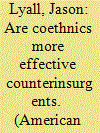

|
|
|
|
|
| Publication |
2010.
|
| Summary/Abstract |
Does ethnicity matter for explaining violence during civil wars? I exploit variation in the identity of soldiers who conducted so-called "sweep" operations (zachistki) in Chechnya (2000-5) as an empirical strategy for testing the link between ethnicity and violence. Evidence suggests that the intensity and timing of insurgent attacks are conditional on who "swept" a particular village. For example, attacks decreased by about 40% after pro-Russian Chechen sweeps relative to similar Russian-only operations. These changes are difficult to reconcile with notions of Chechen solidarity or different tactical choices. Instead, evidence, albeit tentative, points toward the existence of a wartime "coethnicity advantage." Chechen soldiers, enmeshed in dense intraethnic networks, are better positioned to identify insurgents within the population and to issue credible threats against civilians for noncooperation. A second mechanism-prior experience as an insurgent-may also be at work. These findings suggest new avenues of research investigating the conditional effects of violence in civil wars.
|
|
|
|
|
|
|
|
|
|
|
|
|
|
|
|
| 2 |
ID:
065855
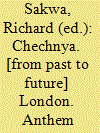

|
|
|
|
|
| Publication |
London, Anthem Press, 2005.
|
| Description |
xvii, 300p.pbk
|
| Standard Number |
1843311658
|
|
|
|
|
|
|
|
|
|
|
|
Copies: C:1/I:0,R:0,Q:0
Circulation
| Accession# | Call# | Current Location | Status | Policy | Location |
| 050142 | 947.52/SAK 050142 | Main | On Shelf | General | |
|
|
|
|
| 3 |
ID:
089330
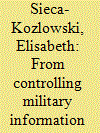

|
|
|
|
|
| Publication |
2009.
|
| Summary/Abstract |
This article demonstrates how the Russian state's reconstruction of the communication network for the armed forces and information services served two purposes: firstly, to silence the free media and exert control of information on a nationwide level, and secondly, to draw upon the armed forces to reinforce its patriotic discourse. The relative liberalization of the media in the early 1990s led to a media defeat of the Russian army during the First Chechen war. Consequently, in the second war, renewed control of the media was progressively established, the goal of which was to deny access to independent journalists, on one hand, and to set up a more efficient communication network, on the other. This restructured network encompassed the internal network of the armed forces but was also destined to serve the outer civilian world - the Rosinformtsentr was created to this end. The implementation of these measures intensified over the summer of 2000, finally culminating in the adoption of the Information Security Doctrine, the revamping of military media and the placement of siloviki members in certain media posts. By putting the army back on center stage and giving it a prominence that it had lacked ever since the end of the USSR, the government attempted to mobilize society around a nationally sanctioned idea. The army, which easily fell into its historically familiar role, which it had actually never fully relinquished, has been able to easily reactivate this military-patriotic tendency in the public and to thus propagate a form of traditional military thinking that tends to be resistant to reform.
|
|
|
|
|
|
|
|
|
|
|
|
|
|
|
|
| 4 |
ID:
144643
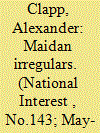

|
|
|
|
|
| Summary/Abstract |
THE UKRAINIAN army was so pitiful when fighting broke out in the Donbas in April 2014 that President Petro Poroshenko had to outsource the nation’s defense to volunteers. By July, approximately fifteen thousand citizens and foreigners had joined “volunteer battalions.” There are two main types. Territorial units were raised throughout Ukraine’s twenty-four oblasts, including Donetsk and Luhansk. There’s a Lviv Battalion and a Kremenchug Company.
|
|
|
|
|
|
|
|
|
|
|
|
|
|
|
|
| 5 |
ID:
105305
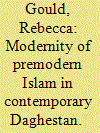

|
|
|
|
|
| Publication |
2011.
|
| Summary/Abstract |
This ethnographic essay investigates the relations between past and present forms of Islam in the north Caucasian Republic of Daghestan. Conversations culled from fieldwork in Daghestani urban and rural spaces are used to elucidate the cultural, religious, and linguistic diversity of life in this region. Ethnographies in a bookstore, a shrine to the Imam Shamil, and a scholarly archive in Makhachkala unfold against the historical background of Daghestan's long-standing encounter with the Arabo-Islamic world. The essay explores how the post-Soviet turn to post-secular Islam represents an alternative to colonialism and a new way of making meaning in the present. It is intended as a contribution to Islamic studies, modernity theory, and post-Soviet Union area studies.
|
|
|
|
|
|
|
|
|
|
|
|
|
|
|
|
| 6 |
ID:
106455
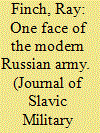

|
|
|
|
|
| Publication |
2011.
|
| Summary/Abstract |
This article will examine General Shamanov's background, the probable rationale for his assignment as airborne commander, his role in the ongoing reform of the Russian military, and the possible future implications for the Russian military and state. This biographical sketch suggests that Shamanov represents a portion of the modern Russian officer corps. These officers (from a variety of security agencies) have merged state, business, and private interests, resulting in a distortion of traditional civil-military relations. As a high-level advisor, and now as Airborne Commander, General Shamanov continues to influence the course of military reform. There is speculation that General Shamanov could become the next Minister of Defense. While the Russian military has a long tradition of remaining outside politics, if the domestic situation in Russia were to become dire, General Shamanov could help choose, or even become, the next Russian commander-in-chief.
|
|
|
|
|
|
|
|
|
|
|
|
|
|
|
|
| 7 |
ID:
163350
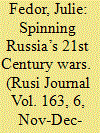

|
|
|
|
|
| Summary/Abstract |
In this article, Julie Fedor examines contemporary Russian militarism through an introduction to one of its most high-profile representatives, the novelist, Chechen war veteran and media personality Zakhar Prilepin. She focuses on Prilepin’s commentary on war and Russian identity, locating his ideas within a broader strand of Russian neo-imperialism.
|
|
|
|
|
|
|
|
|
|
|
|
|
|
|
|
| 8 |
ID:
111642
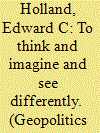

|
|
|
|
|
| Publication |
2012.
|
| Summary/Abstract |
This paper, while acknowledging the import of popular geopolitics for understanding how foreign policies are interpreted in an everyday sense, argues that this literature has glossed over a set of key oppositional cultural formats, such as documentary films, satirical newspapers, and non-fiction comic books (referred to here as graphic narratives), which also influence the geopolitical imaginations of their consumers. Using Ó Tuathail's concept of the anti-geopolitical eye, the paper considers how popular geopolitical understandings are constructed, arguing that these oppositional formats, and graphic narratives in particular, challenge hegemonic scriptings of geopolitics through a bricolage of narrative techniques. Discussing the work of comics journalist Joe Sacco and his graphic narrative "Chechen War, Chechen Women" in detail, the paper considers how three distinct narrative techniques he employs - historical interlude, the singular panel, and the depiction of the banal - make possible a counter-hegemonic reading of the individual, localised consequences of the Chechen conflicts.
|
|
|
|
|
|
|
|
|
|
|
|
|
|
|
|
|
|
|
|
|